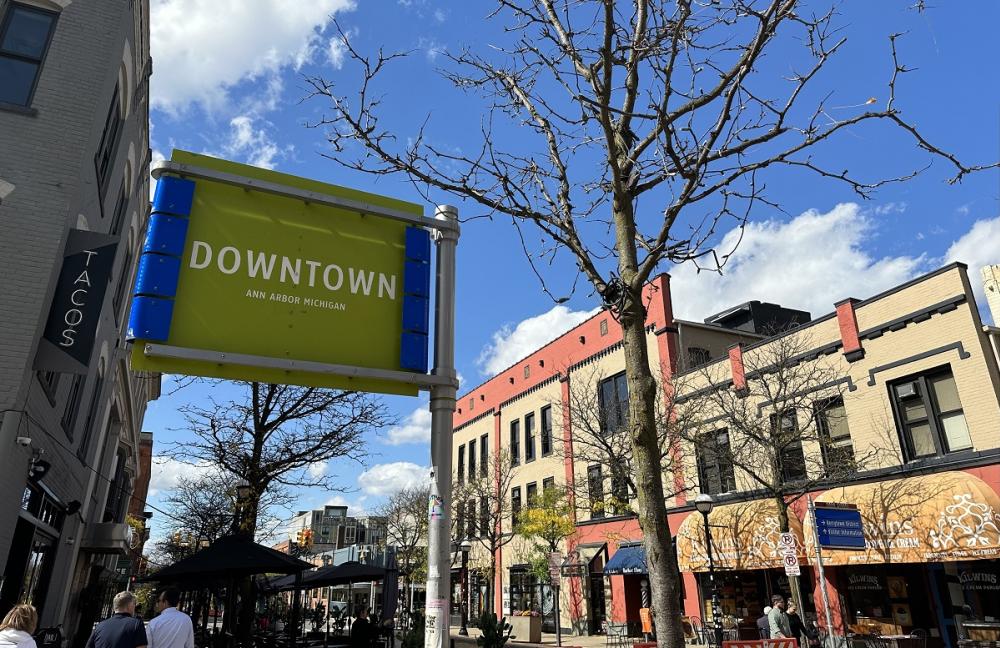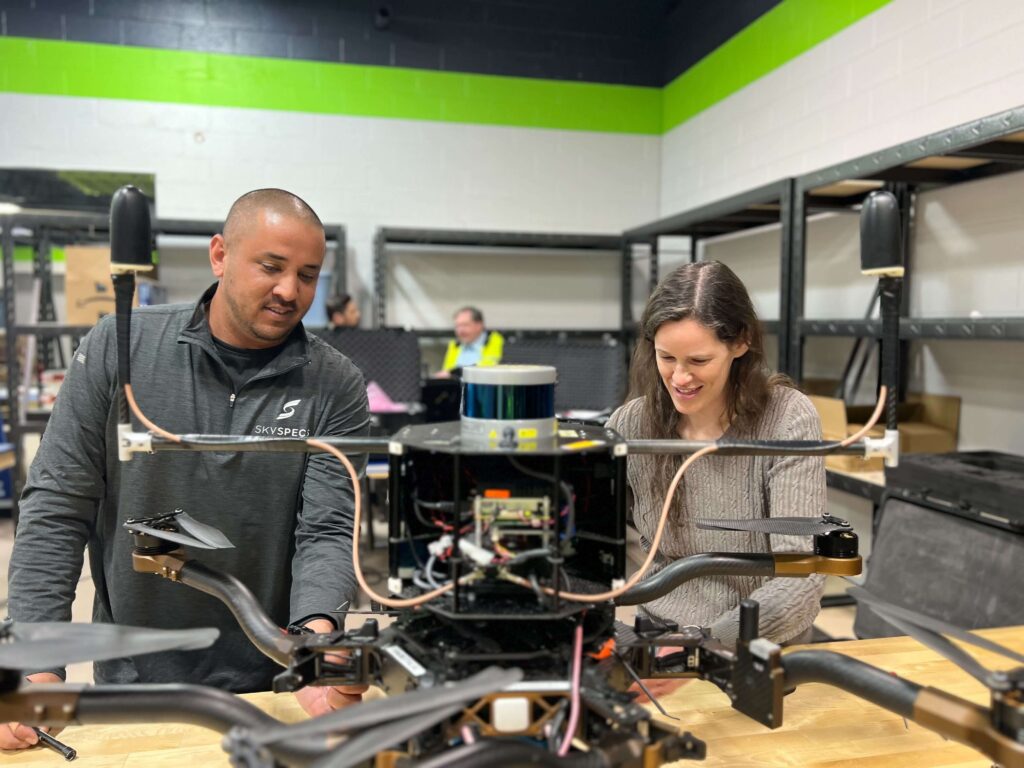
By Lauren Zyber, Purpose Jobs
When the economy gets tough, you might think that entrepreneurship would and should decline. But the opposite is true.
While venture capital funding has dramatically slowed down recently, entrepreneurship is still a vital part of economic growth. Not only does it boost the economy, but it also makes it more resilient.
As entrepreneurship continues to rise in Southeast Michigan, it’s critical that its development continues to be supported, for the sake of the economy in the region and throughout the state.
And it can’t be done alone.
Beyond Job Creation
Jobs are one of the biggest indicators of economic health and growth. If they’re aren’t enough well-paying jobs for people in the community, people experience financial hardships, cut back on spending, and it’s a downward spiral effect for the economy. Of course, large and established companies can be great for job creation. But so can entrepreneurship.
In fact, entrepreneurship is responsible for nearly thirteen million new jobs in the United States since 1997. In the last 25 years, two out of every three new jobs created have been from small- to medium-sized enterprises.

On top of jobs, entrepreneurship helps create wealth for business leaders and their employees. It can also be a means to create jobs more sustainably. Instead of a one-time stimulus package, entrepreneurship works in sync with the rises and falls of the market, creating jobs that last — not just when the government gives it a little boost.
This is also an important component to economic revitalization in historically underserved communities. Having sustainable job growth that puts wealth in the pockets of the community members only improves the community: it can reduce poverty, increase access for resources and education, help develop necessary services in a community, and create meaningful economic opportunities for people. When economic opportunities exist, people choose to live and work and thrive in these communities.
Building Resilience
Years after the onset of the COVID-19 pandemic, communities are still dealing with the sudden and unexpected economic impacts from the pandemic. Though it may seem like these are the times when entrepreneurship would decline, it’s actually entrepreneurship that makes the economy all the more resilient.
Take Michigan’s economy for example. When the automotive industry crashed in 2008, it was devastating for so many in Michigan because the economy had historically been so focused on automotive manufacturing.
When entrepreneurs add new industries into the mix, a market crash like that becomes less disruptive, because there are other thriving industries that people in the region can rely on.
Additionally, when times get tough, it can actually lead to an increase in entrepreneurship. We saw this play out in Ann Arbor after Pfizer closed its doors in 2007. When the company laid off about 2,100 employees in Ann Arbor, it planted a seed for a new kind of economic growth in the city. Many ex-Pfizer employees went on to start their own healthtech businesses, such as Esperion Therapeutics, Lycera, Valesco, Research Essential Services and MichBio.org. Now Ann Arbor is only further solidified as a top hub for biotech and healthtech innovation.
Of course there are other challenges that come with starting a business during an economic downturn (like raising capital, for example), but as entrepreneurship continues to grow, the economy becomes more and more resilient.
It Takes A Village — And a State
To make entrepreneurship easier and more successful in communities — and therefore reap the benefits of it — it’s important to make sure that there’s support in place. Ann Arbor is a great example of what can happen to a small city with some big help.
In 2001, the Michigan Economic Development Corporation (MEDC) created 11 SmartZones throughout the state. A few years later, the Ann Arbor/Ypsilanti SmartZone partnered with Ann Arbor SPARK, a non-profit economic development organization, to carry out entrepreneurial programs. Since then, Ann Arbor SPARK and the SmartZone have taken the very small portion allotted from the state budget (about 0.0009%) and used it to help serve 657 startup companies and spur $248 million in new private capital investment — and counting!
Other services SPARK provides include business resources, an incubator for emerging startups, mentorship, marketing, financial planning, assisting with finding office space, and more.

“Ann Arbor proved to be an exceptional launchpad for our company. Fellow entrepreneurs offered invaluable guidance and motivation. Organizations like SPARK gave us essential resources, from grants and loans that kickstarted our journey to office spaces that accommodated our growth,” says Molly McFarland, co-founder and CRO of AdAdapted in Ann Arbor. Molly says she also received crucial capital support from local angel investors.
Both Molly and Jeff Mason, an entrepreneur known for founding Groundspeed Analytics and Tropolis Insurance, say that having a strong talent pool is also crucial for building up a business.
“Ann Arbor is a small city that delivers big city benefits. Our talent pool is highly educated. Ann Arbor is by some measures the most educated city of its size in the country. People want to live here because the city provides incredible access to education, healthcare, and diverse cultural experiences,” Jeff says. “As a technology-enabled insurance brokerage, I founded Tropolis here because of the incredible talent pool and the dynamic and vibrant tech ecosystem.”
Jeff also says that he received support for fundraising, sales/marketing, technical design, leadership, and recruiting from Ann Arbor SPARK as well as the University of Michigan’s Zell Lurie Institute for Entrepreneurial Studies.
“I believe that my participation in the Ann Arbor Spark startup bootcamp was instrumental to the rapid growth and success of my prior company, Groundspeed,” says Jeff.
As the state continues to invest more in startups and technology, these kinds of services are crucial for economic growth and need to be built into development plans. Currently, the state is reviewing an $80.7 billion spending proposal for the next budget cycle. The proposed budget includes $60 million for the Michigan Innovation Fund.
To help continue to ensure a strong talent pool in Michigan, the MEDC has also launched a $20 million marketing campaign called, “You Can In Michigan” to attract top talent to the state. The campaign highlights job opportunities at rising startups and tech companies as well as a high quality of living that the state offers.
This is something Bill Mayer, Senior Vice President of Entrepreneur Services at Ann Arbor SPARK, recognizes as a huge strength for the ecosystem.
“We have a low cost of living and an easy commute. There’s so much going on in Ann Arbor. It’s not a sleepy college town by any means,” says Bill. “There’s an inordinate amount of startup and tech activity. This is a direct result of smart people from the university, and commitments from the state of Michigan that support early stage tech.”
As the state continues to grow as a top startup and tech hub, having resources like dedicated investments for startup innovation, and having programs like SPARK that make these resources available and accessible, entrepreneurship activity will only continue to grow. And the economy will be much better off for it.
“There’s no ‘right time’ or ‘wrong time’ to start a company. Challenges are inevitable, but Ann Arbor is uniquely equipped to support entrepreneurs,” says Molly. “If you’re passionate about your idea, jump in and pursue it with determination.”